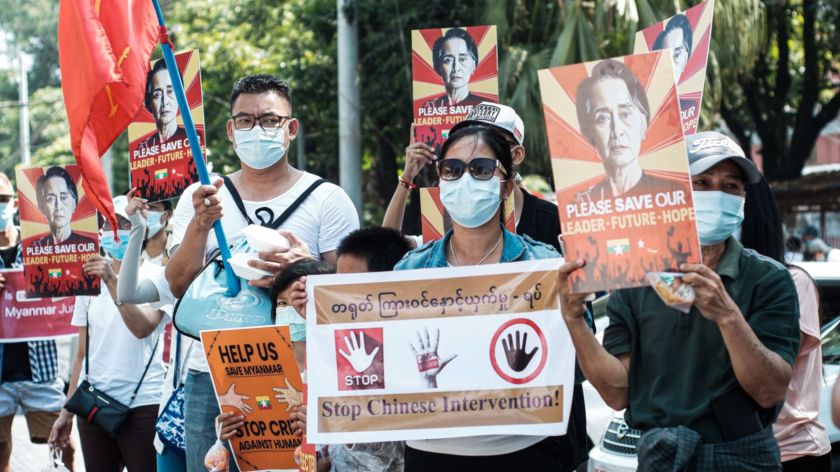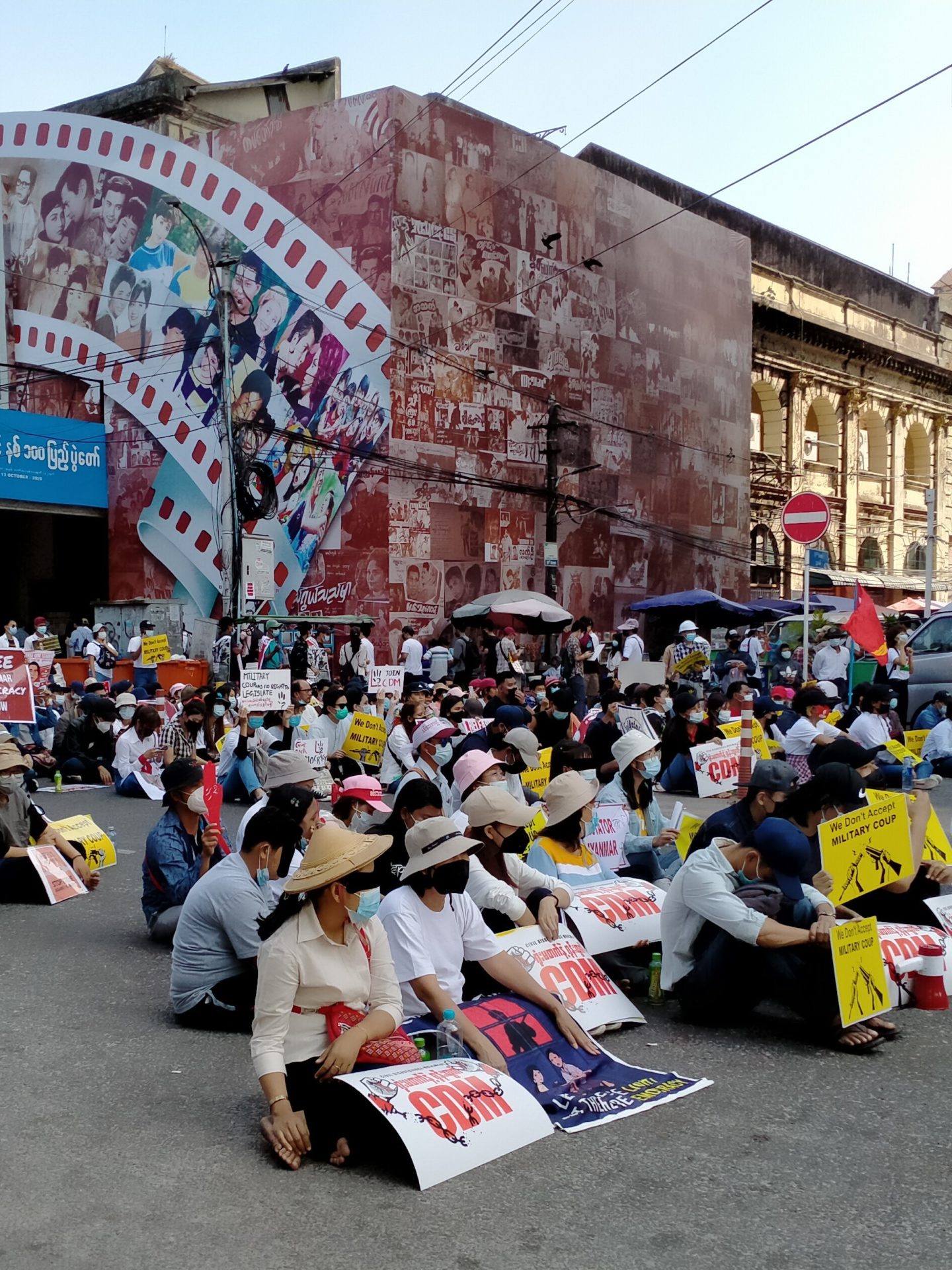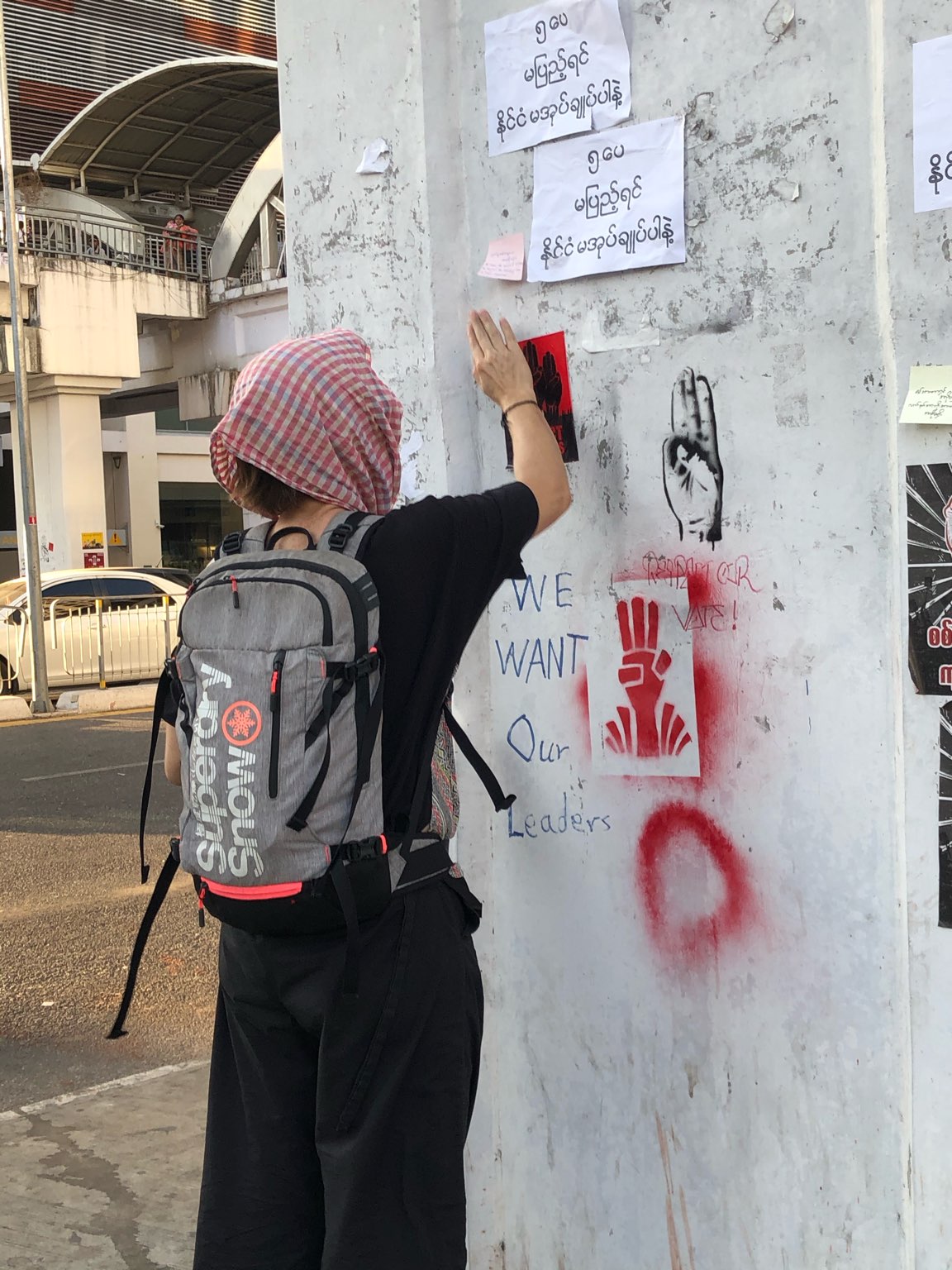Tear gas and shooting military won’t keep Romielle out of Myanmar: ‘My home is there’
-
 Foto: MgHla via WikiCommons
Foto: MgHla via WikiCommons
The bullets were flying through her street. Ex-Radboud-student and -staff Romielle lives and works in Myanmar and went through the military coup on the 1st of February. She refuses to passively watch how Myanmar is floating away from democracy. ‘I too have a voice.’
She’s in the Netherlands for a short time. But as soon as she’s able to, she will go back to Myanmar. Regardless of the coup and the violent chaos that followed. Regardless of the dire situation around corona in the country. ‘My home is there,’ Romielle says, who does not want to appear in this article with her real name due to safety reasons. ‘You don’t just give up on that,’ she says inside a typically Dutch restaurant on the edge of Zeist, the village of her youth.
Romielle – who has studied and worked at the Radboud University – is teacher and academic director of a private, non-profit university for the humanities in Yangon, the biggest city of Myanmar. In 2019, she went to live in the Southeast Asian country.
‘Students of mine were arrested and have disappeared. Until this day they have not returned.’
Because her father got ill, she flew back to the Netherlands. She was meant to return to Myanmar quickly but after the coup on the 1st of February, it’s become more difficult. The government services are down. Her request to travel into the country is lying on some Myanmar’s official’s desk who has other priorities.
And so, she works from behind her laptop, in her mother’s house in Zeist. She teaches her classes online, develops educational programs, and works on administrative tasks for the small and young university. The contrast between her guest spot within the forests of the hills in Utrecht and her usual residence in Yangon, a city of millions, could not have been bigger.
Especially since Myanmar has been thrown into chaos this year. The democratically chosen government which was led by Nobel prize winner Aung San Suu Kyi, was shoved aside by the military on the 1st of February. The citizens of Myanmar who had gotten a taste of democracy the past decade, responded by going on strike in large numbers.
The price they paid was high. According to the AAPP, an organisation started by former political prisoners, more than 1,000 casualties have been reported since the beginning of the Spring revolutions. Almost 8,000 citizens are kept prisoner. The images of the violence in the streets of Yangon and outside of the city have shocked the world last spring.
Bio
Romielle is academic director at a private, non-profit university, established in 2017. Between 2012 and 2019, she worked as an education consultant in Cambodia, among other things. She studied philosophy of child-raising and worked at the Radboud University, within the area of orthopedagogy. For a short time, she worked as writer and editor for the magazine owned by Gender Studies. In Leiden, she wrote her dissertation on the relationship between teacher and student.
Romielle doesn’t want to appear in this article with her full name because of privacy and safety reasons. Certain personal details have also been left out. Romielle’s real name is known amongst editorial staff.
As teacher at the university, Romielle was suddenly amidst the revolt. ‘Students of mine were arrested and have disappeared. Until this day they have not returned. I don’t know if they have been tortured or if they’re alive. While I’m absolutely certain that they’ve done nothing but protest against an illegal takeover.’
Immediately after the coup, there wasn’t as much brutal violence, says Romielle, who also regularly participated in large-scale protests. ‘The atmosphere was almost festival-like. The people were angry but not aggressive. The texts on the banners were all creative slogans. Residents in the vicinity all came outside to hand out food and drinks.’ When the military started shooting, that friendly ambience was soon gone. The protest changed into a guerrilla conflict.
Why did you join the protests as a western expat?
‘My friends are from Myanmar. I don’t speak the language very well yet so I mostly surround myself with highly educated people who speak English. Most of them are students, scientists, or artists. Those groups are the ones that are most often openly critical. I can’t just sit behind my computer while the country is in ruin and I too have a voice.’
How did the protests impact your daily life?
‘I live in a neighbourhood that knows much resistance. The protesters regularly came through the street there, on the run for the military. I live on the sixth floor and sometimes it was unbearable to be on my balcony – because of the tear gas.’
‘I told my students that this giant, the army, would go down sooner or later’
‘During my online classes, I sometimes heard myself casually say that I would mute myself for a bit because there was shooting outside on the street. As if I said that the dog was barking. I had already moved my desk to the middle of the room – away from the window. Those military lunatics would just shoot in the air and would randomly hit buildings – you never know where a bullet like that is going to go.’
How did your students react to the violence?
‘They were very distracted. Their thoughts were elsewhere. I responded to that by developing a new course: resilience and resistance. But I also said that it was okay if students could not join class because they were busy with resistance activities.’
‘We also asked ourselves as a private university if we should even continue to give classes. Many government services put down their work as a response to the coup. Public universities also closed due to what they called the disobedience movement. What kind of message do you emit by continuing classes? Still, we chose to continue: education is a fundamental right and not all students were active in the resistance.’
What will the protests bring to the people? The military still has control, half a year after the coup.
‘I told my students that this giant, the army, would go down sooner or later. It has absolutely no support, no legitimacy. I still read about soldiers who are defecting every day. Cracks are appearing in the stronghold of the regime.’

‘It’s a war of attrition. The disobedience movements not only affect the army but also the population of Myanmar. Medical staff, public transport staff, teachers, port workers; they all stopped working. Some of them have lost their jobs. Or they have been locked up, or are in hiding. Others are forced to continue working. But that too is dangerous because you can be seen as a defector. There are sometimes attacks on people who work for the regime. They are shot down.’
How do you see Aung San Suu Kyi’s position, who was impeached and arrested in February? Outside of Myanmar, she has lost much reputation by not taking a stand against the genocide on the Rohingya population in Myanmar.
‘She was the leader of the civilian government but the army still had control over the country. In the constitution, it says that the army-inclined party always has the majority of seats. If Suu Kyi had spoken against the violence done to the Rohingya people, it could’ve meant the end of the civilian government. I’m not making excuses – it remains culpable that she never took a stand against the genocide but she has had to make a difficult consideration.’
‘During the elections in November last year I was an international observer, to see if the elections proceeded fairly. The conclusion was clear: there was nothing wrong with the elections. Aung San Suu Kyi had won in an honest manner. How the citizens of Myanmar and the countries outside Myanmar look at her differs a lot. In Myanmar she’s seen as a patroness, she receives infinite respect.’
Have you been involved with the resistance against the army?
‘Together with artists, I have designed and printed banners and phone stickers. I was the one who then transported all that stuff through the city on my bike. I did think then: I hope they won’t check me. As an outsider you have the advantage that soldiers leave you alone. They don’t want any trouble with foreign powers.’
‘There’s another way I’ve supported the resistance, namely financially. Wages are higher for expats than for the local population, so I was able to put something aside for a good cause.’
‘I’m not the sort of expat that immediately leaves when it becomes difficult’
You’ve lived in Myanmar since 2019. How come you’re so involved in the country?
‘In a short time, I’ve started feeling very connected to the country. Before my move to Myanmar, I lived in Cambodia. That was the first country where I went to on a one-way ticket. Still, I’ve never had that unexplainable feeling of connection with Cambodia the way I have it now with Myanmar. It’s about the contact with the people who live there. People in Myanmar are naturally peaceful and cooperative but they’re also combative. Especially younger people turn their words into deeds: they are prepared to give their life for democracy.’
‘When it went horribly wrong in February, some friends and family in the Netherlands thought: now she’ll return. But that was never a serious option. I’m not the sort of expat that immediately leaves when it becomes difficult. That’s why I feel guilty in a way because I’m safe in the Netherlands now – and the people of Myanmar are not.’
When you see everything that’s happening in Myanmar – how does it make you feel?
‘I’m incredibly sad. The population is hurting so much. But I’m also disappointed. I call myself a humanist – all people are good, that sort of thing – but I’m facing the truth now that there’s a small group of power-hungry lunatics who can really mess it all up.’
‘Corona is now put on top of that. The people of Myanmar are trapped. They cannot leave the country and they have no government that they can turn to. The army is enriching themselves and they’re taking all oxygen tanks. Citizens have to fend for themselves. It’s very tragic.’




